Is There Space for Joyful Environmental Justice Work?
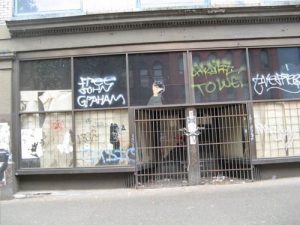
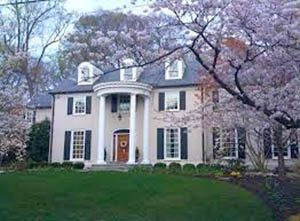 Environmental justice is necessary for the full flourishing of human and non-human nature. The urgency is real and needed. Structural inequalities lead to environmental disruptions affecting our food, soil, water, climate, work, and production and consumption systems that harm the most vulnerable. At the same time, those with class, ethnic, racial, gender, and other privileges have greater access to environmental goods, such as pollution-free neighborhoods, healthy food, safe workplaces, and green spaces. This is the essence of injustice.
Environmental justice is necessary for the full flourishing of human and non-human nature. The urgency is real and needed. Structural inequalities lead to environmental disruptions affecting our food, soil, water, climate, work, and production and consumption systems that harm the most vulnerable. At the same time, those with class, ethnic, racial, gender, and other privileges have greater access to environmental goods, such as pollution-free neighborhoods, healthy food, safe workplaces, and green spaces. This is the essence of injustice.
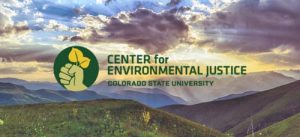
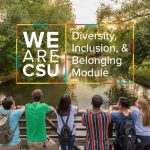 In 2020, the Center for Environmental Justice (CEJ) at Colorado State University was launched specifically to create a space to counter such outcomes and address their root causes. The CEJ seeks to identify and develop solutions to the environmental injustices that permeate all aspects of society. Some key goals for the center are to make environmental justice a central lens for the university, faculty, students, and the broader community to act on sustainability and democracy. Also, the CEJ seeks to create a diverse and inclusive environmental justice community that will facilitate collaborative research, teaching, and engagement across disciplines and between academia and the broader society.
In 2020, the Center for Environmental Justice (CEJ) at Colorado State University was launched specifically to create a space to counter such outcomes and address their root causes. The CEJ seeks to identify and develop solutions to the environmental injustices that permeate all aspects of society. Some key goals for the center are to make environmental justice a central lens for the university, faculty, students, and the broader community to act on sustainability and democracy. Also, the CEJ seeks to create a diverse and inclusive environmental justice community that will facilitate collaborative research, teaching, and engagement across disciplines and between academia and the broader society.
Lastly, the CEJ seeks to link diverse environmental knowledge systems and historical experiences to address the failures of capitalism, colonialism, racism, patriarchy, and other systems of exploitation and oppression in our community and beyond.
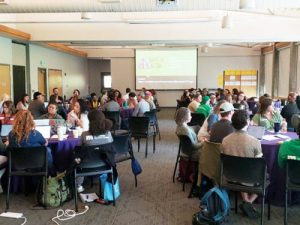 As a Rachel Carson Council Fellow, I have been working to support and lead initiatives at the Center for Environmental Justice such as community engagement events in northern Colorado focused on outdoor air quality, developing environmental justice curriculum at Colorado State University, and attending an event focused on environmental justice and equity in conservation and the outdoors.
As a Rachel Carson Council Fellow, I have been working to support and lead initiatives at the Center for Environmental Justice such as community engagement events in northern Colorado focused on outdoor air quality, developing environmental justice curriculum at Colorado State University, and attending an event focused on environmental justice and equity in conservation and the outdoors.
As the lead for the community engagement events focused on air quality, I have begun meeting with a variety of partners ranging from the City of Fort Collins, Larimer County, faculty at Colorado State University, and two local grassroots organizations – Fort Collins Community Action Network (FCCAN) and Fuerza Latina Fort Collins. In these initial conversations, my partners and I have begun discussing what we hope to achieve. The goals range from building civic capacity to storytelling to celebration of the communities of Northern Colorado. Currently, the focus is staying true to the justice part of environmental justice by approaching the design of these workshops from start-to-finish with intentional coordination from our grassroots partners. The workgroup has planned to meet again in November with a visual facilitator to continue developing the goals and outcomes for these community engagement events. Along with a meeting planned for November, I will be attending a variety of community events that FCCAN and Fuerza Latina are putting on in my own community so I can continue building relationships with local partners and investing my time to help the community tackle a variety of problems.
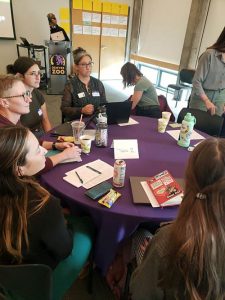 Another project that I have been working on is supporting the development of environmental justice for Colorado State University. Currently, I have participated in the development of an Environmental Justice Graduate Certificate program for master’s and doctoral students. It will equip students with the tools to recognize and address environmental injustices. The certificate program offers a holistic and critical examination of environmental justice, employing multiple frameworks from liberal arts, public health, engineering and more. Students will study the distribution of environmental benefits and harms, the epidemiological consequences of pollution, the impacts on cultures and voices, the role of inclusive and democratic participation, and the restoration of social and ecological damages. The courses included in the certificate program engage with a broad range of theoretical perspectives and offer practical examples of real-world environmental injustices. This certificate program is in its final stages and is looking to be launched by the university Fall 2023.
Another project that I have been working on is supporting the development of environmental justice for Colorado State University. Currently, I have participated in the development of an Environmental Justice Graduate Certificate program for master’s and doctoral students. It will equip students with the tools to recognize and address environmental injustices. The certificate program offers a holistic and critical examination of environmental justice, employing multiple frameworks from liberal arts, public health, engineering and more. Students will study the distribution of environmental benefits and harms, the epidemiological consequences of pollution, the impacts on cultures and voices, the role of inclusive and democratic participation, and the restoration of social and ecological damages. The courses included in the certificate program engage with a broad range of theoretical perspectives and offer practical examples of real-world environmental injustices. This certificate program is in its final stages and is looking to be launched by the university Fall 2023.

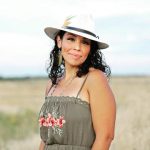 Along with the air quality engagement events and the Environmental Justice Graduate Certificate Project, on September 28th and 29th, I attended the Equity in Conservation and Outdoor Recreation (E.C.O.R.) Summit for Action for the CEJ. E.C.O.R. was a two-day event for thought-provoking discussions around the intersection of equity and inclusion in environmental conservation and outdoor recreation movements. The focus of this year’s summit was specifically on environmental justice in conservation and outdoor recreation movements. As a participant, I heard from a variety of environmental leaders with various identities such as the charismatic keynote speaker, Renee Chacon, a Diné/Xicana/Filipina from South Colorado and New Mexico, who is Executive Director of Womxn from the Mountain. I was then able to have discussion with the speakers and other participants on the issues that those with marginalized identities face in the environmental movement. This community allowed for essential networking and relationship building to help me in accomplishing future projects for the CEJ. There was also helpful education in best practices for environmental justice work and learning how to amplify the joy that exists in communities.
Along with the air quality engagement events and the Environmental Justice Graduate Certificate Project, on September 28th and 29th, I attended the Equity in Conservation and Outdoor Recreation (E.C.O.R.) Summit for Action for the CEJ. E.C.O.R. was a two-day event for thought-provoking discussions around the intersection of equity and inclusion in environmental conservation and outdoor recreation movements. The focus of this year’s summit was specifically on environmental justice in conservation and outdoor recreation movements. As a participant, I heard from a variety of environmental leaders with various identities such as the charismatic keynote speaker, Renee Chacon, a Diné/Xicana/Filipina from South Colorado and New Mexico, who is Executive Director of Womxn from the Mountain. I was then able to have discussion with the speakers and other participants on the issues that those with marginalized identities face in the environmental movement. This community allowed for essential networking and relationship building to help me in accomplishing future projects for the CEJ. There was also helpful education in best practices for environmental justice work and learning how to amplify the joy that exists in communities.
My ongoing work has strongly influenced how I will continue to do environmental justice work moving forward. Developing engagement events, a curriculum on environmental justice, and attending the E.C.O.R. summit have allowed me to reframe my thinking. All these events or programs can be educational, but they can also be celebratory. They can celebrate the past of a community, what a community has already accomplished, and what a community plans to accomplish in the future. While the topic of environmental justice is extremely hard to conceptualize and may seem like a daunting task, it does not have to be. The work can be happy, celebratory, and fill people with joy. It is important to ground myself in the idea that environmental justice work does not have to be sad; the long-term goal is to improve the wellbeing and happiness of all people. It has proven not to be a sorrowful or angry journey, but one filled with joy.
— Sidra Aghababian
 RCC Fellow Sidra Aghababian is a second-year master’s student at Colorado State University (CSU) studying Environmental Policy and Politics specializing in community engagement, environmental justice, and just transitions. Currently, at CSU, she works with the Center for Environmental Justice (CEJ) and the Center for Public Deliberation (CPD). At the CEJ she assists in creating a diverse and inclusive environmental justice community that facilitates collaborative research, teaching, and engagement across disciplines and between academia and the broader society. At the CPD she works at enhancing local democracy through improved public communication and community problem-solving. Sidra also serves on the City of Fort Collins Energy Board which helps advise the City Council and staff on the City’s energy and climate legislative policy
RCC Fellow Sidra Aghababian is a second-year master’s student at Colorado State University (CSU) studying Environmental Policy and Politics specializing in community engagement, environmental justice, and just transitions. Currently, at CSU, she works with the Center for Environmental Justice (CEJ) and the Center for Public Deliberation (CPD). At the CEJ she assists in creating a diverse and inclusive environmental justice community that facilitates collaborative research, teaching, and engagement across disciplines and between academia and the broader society. At the CPD she works at enhancing local democracy through improved public communication and community problem-solving. Sidra also serves on the City of Fort Collins Energy Board which helps advise the City Council and staff on the City’s energy and climate legislative policy
Photo Logo for the Center for Environmental Justice – Colorado State University
Photos from E.C.O.R Summit for Action
![]() The Rachel Carson Council depends on tax-deductible gifts from concerned individuals like you. Please help if you can.
The Rachel Carson Council depends on tax-deductible gifts from concerned individuals like you. Please help if you can.
![]() Sign up here to receive the RCC E-News and other RCC newsletters, information and alerts.
Sign up here to receive the RCC E-News and other RCC newsletters, information and alerts.






